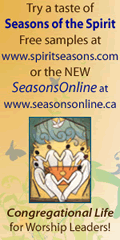Vol 8 Issue 1SectionsPriorities This IssuePrioritiesAfter Easter: Hope, and Happy Birthday!>> Extended Interview with Rev. Dr. Michael Kinnamon>> The Text, Webster, and Intuition>> TransitionsAnother Really Big Fish Story>> TraditionsEaster, Hope, and “Happy Birthday!”>> “Children, Have You Any Fish?”>> Wisdom & WonderingI am going out to fish>>
|
ArchivesA Slim Hope
I took a deep breath, looked into the unknown, and decided:
To describe the journey of the transplant patient is to risk cliché at every turn. It is an absolute miracle. It is horrifying. It is a priceless gift. It is a huge responsibility. It is healing. It comes with scars. It is the story of Lazarus, and at some basic level, it is the story of the hemorrhaging woman, reaching out to grab the healing hem of Jesus’ robe – the slim hope that thrusts you into the future. In 1998, my kidney disease had progressed to the point where my doctor advised that I be screened for a transplant. I went through a day of tests and interviews at the University of Minnesota, which by my good fortune has a premier program for kidney transplantation and is also in my own “backyard.” Many patients travel across country and internationally to seek transplants here. I was approved for the waiting list, and so it began… the wait.
After about three years of waiting, my family began agitating for change – they apparently could see things I wasn’t willing to. Was I sure I was still on the list? Wasn’t there something my doctors could do to move this along? From the first diagnosis, my sister had enthusiastically offered herself to me – her kidney, her tissue, and her unconditional love and support. However, by the time I was cleared for transplant she had gone through her own remarkable death-to-life experience. She was devastated that she was now unable to help me. But others began to emerge, offering me one of their own kidneys: a colleague, my cousin, my brother, my pastor. Each of them went through the screening and in each case we were deemed “compatible.” However, with each person, the screening uncovered some other health condition that made donation unadvisable for them. I felt guilty and responsible that because of their willingness to help me, these people were hearing about health problems. But my pastor asked me to reframe those thoughts. “Think of all the ways God is restoring health as together we seek healing for you. It’s all good.” In the spring of 2003, another friend asked to be tested and he too was found to be a compatible donor, though they noted that his blood pressure was high. He committed to a new regimen of diet and exercise and in a few months was cleared. Surgery was scheduled for late July. About two weeks before the surgery I stood in the church parking lot, waving goodbye to my then 16-year-old daughter as she left on a youth trip. We had talked about the upcoming surgery and whether she had any concerns. She hugged me and said she trusted me. We drew the sign of the cross on one another’s foreheads and we both agreed it would be all right. I was relieved she was away for a while. I never lied about my condition, but I tried to shield her from my own concerns. That night as I hooked up for dialysis I prayed, “Please help me, God. I don’t know how much longer I can do this. I’m so tired. I trust in you.” I went to sleep in that prayer and woke to another day. I got ready for work and the phone rang. It was the transplant team at the University, calling to say that they had received a kidney and a pancreas for transplantation and that I should be at the hospital by 11 that morning. Not only would the kidney restore me to health – the pancreas would mean I was no longer diabetic, and that the diabetes that began the whole ugly cycle would be arrested. In the ten seconds it took to hear that sentence I was thrust back to the time of the initial diagnosis. I hadn’t wanted this, but now it had become my prayer. Things take time, and this was clearly it. I had no trouble saying “yes” this time. And in that moment of unbelievable relief, I also had to acknowledge that while this was the very best day of my life, this was the very worst day for some family somewhere who was saying goodbye to a beloved one. These are not the plans of God, inflicted on us from out of the blue. This is God stepping tenderly into our most broken places and bringing new life out of the ashes. I awoke from the surgery to a life I had not expected. I had not been
prepared to feel newly alive. In the days that followed I often found
myself at a lounge that looked out over the Mississippi River – nearly
a 180-degree view looking southward. As I scanned the horizon from
east to west I had a keen sense of being surrounded by prayer. I was
part of the great communion of saints – something that extends
across all boundaries of time and space. Whether or not we have a friend or relative in need, we should consider the gift God has given us in our miraculous bodies and make intentional choices about how we will spend our one, beautiful life. We need to take good care of ourselves and extend ourselves to others. We should remember our role as a steward of God’s creation. Together we are here to bring life to fullness and help one another to realize God’s gift of health and wholeness – of shalom. © 2006 Lori Rosenkvist | View
for Printing
|
| All Content Copyright © 2008 ecumininet online!, Spiritual Systems Inc. - Site Design & Maintenance By Atomic Pixels | ||

 No one wants to be a transplant recipient;
No one wants to be a transplant recipient; Nothing much changes when you get “on the list.” You go
through a flurry of tests in the beginning and fill out a ream of paperwork.
You give emergency contact numbers and prepare for what seems to be
some type of invasion. You feel like you have been pushed even closer
to the brink of the unknown. But day by day, time passes without much
event. Your health continues to decline but usually not in noticeable
ways. It is a long, slow, unwinding as you let go of first one norm
and then another. “This is how I am, now,” you reassure
yourself.
Nothing much changes when you get “on the list.” You go
through a flurry of tests in the beginning and fill out a ream of paperwork.
You give emergency contact numbers and prepare for what seems to be
some type of invasion. You feel like you have been pushed even closer
to the brink of the unknown. But day by day, time passes without much
event. Your health continues to decline but usually not in noticeable
ways. It is a long, slow, unwinding as you let go of first one norm
and then another. “This is how I am, now,” you reassure
yourself.